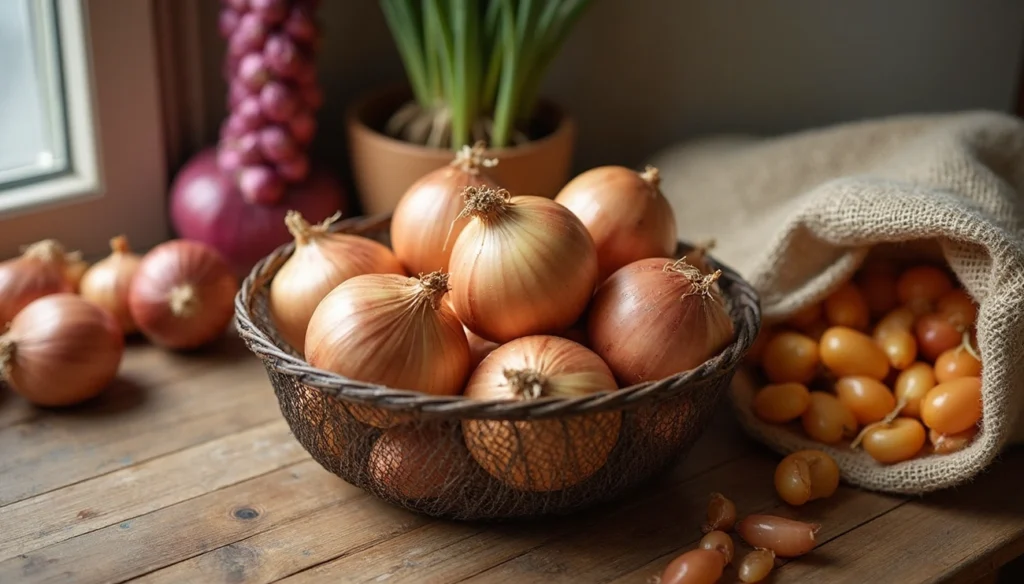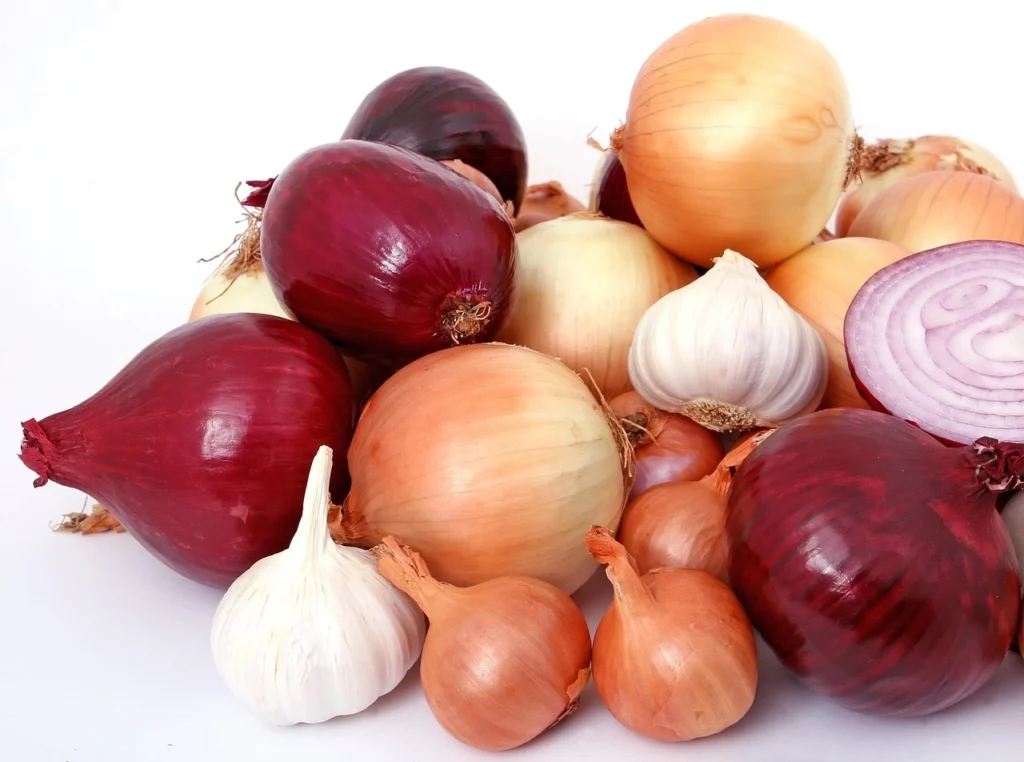How to Store Onions to Last Longer: Chef-Approved Secrets That Work

Did you know that properly stored onions can last up to one year? That’s right — with the correct temperature and conditions, learning how to store onions to last longer isn’t just possible, it’s surprisingly simple.
While most of us might keep onions fresh for 6 to 8 weeks with standard storage methods, the difference between onions that spoil quickly and those that remain usable for months comes down to a few chef-approved techniques. In fact, even if you’re growing your own onions, you can expect them to last 6-9 months or more with proper preservation methods.
However, not all storage approaches are created equal. A halved onion might only last about five days in your fridge, while whole onions stored in cool, well-ventilated, and dry areas of your home can stay fresh for three to six months.
In this guide, we’ll explore the best way to store onions for both short-term freshness and long-term preservation. Whether you’re dealing with whole, halved, or chopped onions, we’ve gathered the most effective techniques to make your onions last longer and reduce food waste in your kitchen.
Understanding Onion Types and Their Storage Needs
Not all onions are created equal when it comes to long-term preservation. Understanding the fundamental differences between onion types is essential for anyone looking to master how to store onions to last longer.
Onions generally fall into two major categories: storage (or hot) onions and fresh (or sweet) onions. This distinction primarily determines how to make onions last longer based on their natural characteristics.
Storage onions are your best choice when considering how to store onions long term. These varieties typically feature thicker outer skins, higher sulfur content, and lower water content than their sweeter counterparts. Additionally, they possess natural resistance to molds and bacteria, making them ideal candidates for extended preservation. Most storage onions are long-day varieties, requiring 14+ hours of sunlight to develop properly.
Conversely, fresh or sweet onions like Vidalias and Walla Wallas contain more water and sugar but less sulfur. Although delicious, they’re not suited for lengthy storage periods and typically last only about three months. These onions require refrigeration and should be used relatively quickly after purchase.
The best way to store onions depends largely on variety selection. For long-term keeping, consider these proven storage varieties:
- Yellow varieties: ‘Copra’, ‘Patterson’, ‘Sweet Sandwich’, ‘Stuttgarter’
- Red varieties: ‘Red Zeppelin’
When selecting onions for storage, look for those that:
- Feel firm and dry
- Have no visible sprouting
- Are free from gray or black mold
- Have tight, dry necks
For those wanting to maximize storage life, understanding environmental conditions is crucial. The optimal temperature range for how to preserve onions is between 45-55°F. Furthermore, maintaining proper air circulation and low humidity levels significantly extends shelf life.
To achieve the best results when learning how to keep onions fresh, never store them in plastic bags, which trap moisture and accelerate decay. Additionally, keep onions away from potatoes and other produce that release moisture, as this hastens spoilage.
Through proper variety selection and creating ideal storage conditions, you’ll master the techniques for how to store onions to last longer, potentially keeping them fresh for 8-12 months.
How to Store Onions to Make Them Last Longer
The secret to extended onion shelf life lies in creating the right storage environment. Mastering how to store onions to last longer begins with understanding the ideal conditions.
For whole, unpeeled onions, the best way to store onions is in a cool, dry, well-ventilated area with temperatures between 45-55°F. Consequently, locations like a cellar, pantry, unheated basement, or garage often provide ideal conditions. These environments help onions maintain their characteristics and extend their lifespan.
Proper ventilation is essential for how to keep onions fresh. Store them in mesh bags, wire baskets, or open containers that allow air circulation. Specifically, avoid plastic bags which trap moisture and lead to spoilage. Indeed, excessive moisture causes onions to sprout or develop mold.
How to make onions last longer also depends on keeping them away from certain produce. Notably, never store onions near potatoes. Onions emit ethylene gas which accelerates potato spoilage, while potatoes’ moisture content promotes onion rot. Additionally, keep onions away from apples, citrus, and bananas which also release ethylene gas.
For how to store onions long term, consider these storage timeframes:
- Whole onions in optimal conditions: 3-6 months
- Whole onions in refrigerator: approximately 2 months
- Whole onions at room temperature: 2-4 weeks
- Peeled onions in refrigerator: 10-14 days
- Cut/chopped onions in refrigerator: 7-10 days
- Cooked onions in refrigerator: up to 4 days
When considering how to preserve onions after cutting, store them in airtight containers, preferably glass ones as plastic absorbs odors. Essentially, once an onion is cut, refrigeration becomes necessary to prevent bacterial contamination.
During storage, check onions weekly and remove any showing signs of sprouting or softening to prevent the issue from spreading to others. Primarily, following these storage principles ensures your onions remain usable longer, reducing waste and saving money on your grocery bill.
Preserving Onions Beyond Storage

Image Source: https://pixabay.com/
Beyond traditional storage methods, there are several techniques to extend onion preservation. These approaches allow you to discover how to store onions to last longer by transforming them into different states for extended use.
Freezing offers an excellent way to preserve onions for extended periods. For this method, simply peel and chop or dice your onions without blanching. Afterward, place them in freezer bags with air removed or freeze separated pieces on trays before packaging. Frozen chopped onions typically remain usable for three to six months. Nevertheless, whole onions aren’t ideal for freezing unless blanched for 3-7 minutes depending on size. Since freezing alters texture, these onions work best in cooked dishes rather than raw applications.
Pickling presents another best way to store onions for extended preservation. This process hinders bacterial growth, potentially extending shelf life up to six months. Quick-pickling takes merely 15 minutes by covering sliced onions with vinegar. Moreover, red wine vinegar creates a visually appealing hot-pink color. Once opened, store pickled onions in the refrigerator to maintain freshness.
For partially used onions, knowing how to keep onions fresh becomes crucial. Store halved or sliced onions in airtight containers in the refrigerator for approximately one week. Ideally, use glass containers as plastic absorbs odors. Peeled whole onions can last up to two weeks refrigerated, whereas diced or sliced onions remain good for 7-10 days.
Cooked onions represent yet another way to make onions last longer. They can be refrigerated for three to five days in airtight containers. Alternatively, freeze cooked onions for up to three months.
For those seeking how to store onions long term, these preservation methods provide solutions beyond conventional storage. By employing these chef-approved techniques, you’ll minimize waste plus always have onions ready for your culinary creations, regardless of their form.
Conclusion
Mastering how to store onions to last longer requires understanding both the nature of onions and their ideal environmental conditions. Throughout this guide, we’ve explored various techniques that professional chefs and gardeners use to extend onion shelf life significantly. Undoubtedly, the best way to store onions starts with selecting the right varieties—storage onions with thick skins and low water content will naturally preserve better than sweet varieties.
Temperature control plays a crucial role when learning how to make onions last longer. The optimal range of 45-55°F, coupled with low humidity and good air circulation, creates the perfect environment for long-term preservation. Consequently, your basement, cellar, or garage might serve as ideal locations during cooler months.
Additionally, proper containers make a remarkable difference in how to keep onions fresh. Mesh bags, wire baskets, or even pantyhose provide the necessary ventilation while preventing moisture buildup. After all, excess moisture remains the primary enemy when attempting to preserve onions for extended periods.
For partially used onions, the refrigerator becomes your ally. Nevertheless, airtight containers, particularly glass ones, help maintain freshness while preventing odor transfer to other foods. Therefore, checking your stored onions regularly and removing any showing signs of spoilage ensures the remaining batch stays usable longer.
Beyond conventional storage, freezing and pickling offer excellent alternatives for how to preserve onions when you have an abundance. These methods transform onions into ready-to-use ingredients that remain available whenever culinary inspiration strikes.
The best way to store onions ultimately depends on your specific needs and available space. Whether you’re storing a small batch from the grocery store or preserving a bumper crop from your garden, these chef-approved techniques ensure your onions remain fresh and flavorful. Most importantly, by implementing these storage secrets, you’ll reduce food waste while always having this essential ingredient on hand for your favorite recipes.
Key Takeaways
Master these chef-approved storage techniques to extend your onions’ shelf life from weeks to months, reducing waste and saving money on groceries.
• Choose storage onions over sweet varieties – thick-skinned, low-water content onions like ‘Copra’ and ‘Patterson’ can last 8-12 months versus 3 months for sweet onions.
• Store whole onions at 45-55°F in ventilated containers – use mesh bags or wire baskets in cool, dry areas like basements or pantries for optimal 3-6 month preservation.
• Never store onions with potatoes – onions emit ethylene gas that spoils potatoes, while potato moisture accelerates onion rot and sprouting.
• Refrigerate cut onions in airtight glass containers – peeled onions last 10-14 days, while chopped onions stay fresh 7-10 days when properly stored.
• Freeze or pickle for extended preservation – frozen chopped onions remain usable for 3-6 months, while pickled onions can last up to 6 months.
The key to long-lasting onions lies in controlling moisture, temperature, and air circulation while choosing the right variety for your storage goals.
FAQs
How long can properly stored onions last?
Properly stored onions can last up to one year. With ideal conditions, whole onions stored in cool, dry, and well-ventilated areas can remain fresh for 3-6 months, while storage onions can last 8-12 months.
What’s the best way to store whole onions?
The best way to store whole onions is in a cool, dry place with good air circulation, ideally at temperatures between 45-55°F. Use mesh bags, wire baskets, or open containers to allow proper ventilation. Avoid plastic bags as they trap moisture.
Can onions be stored in the refrigerator?
Yes, onions can be stored in the refrigerator, especially if they’re cut or peeled. Whole onions can last about 2 months in the fridge, while peeled onions stay fresh for 10-14 days, and chopped onions for 7-10 days when stored in airtight containers.
Why shouldn’t onions be stored near potatoes?
Onions should not be stored near potatoes because onions emit ethylene gas, which accelerates potato spoilage. Additionally, potatoes release moisture that can cause onions to rot or sprout faster. It’s best to keep these vegetables separate.
What are some alternative methods for preserving onions?
Alternative methods for preserving onions include freezing and pickling. Chopped onions can be frozen for 3-6 months, while pickled onions can last up to 6 months. These methods are great for extending the shelf life of onions beyond traditional storage techniques.
Here are some other guides to read
Why Are English Speaking Countries So Rich? It’s Not What You Think
